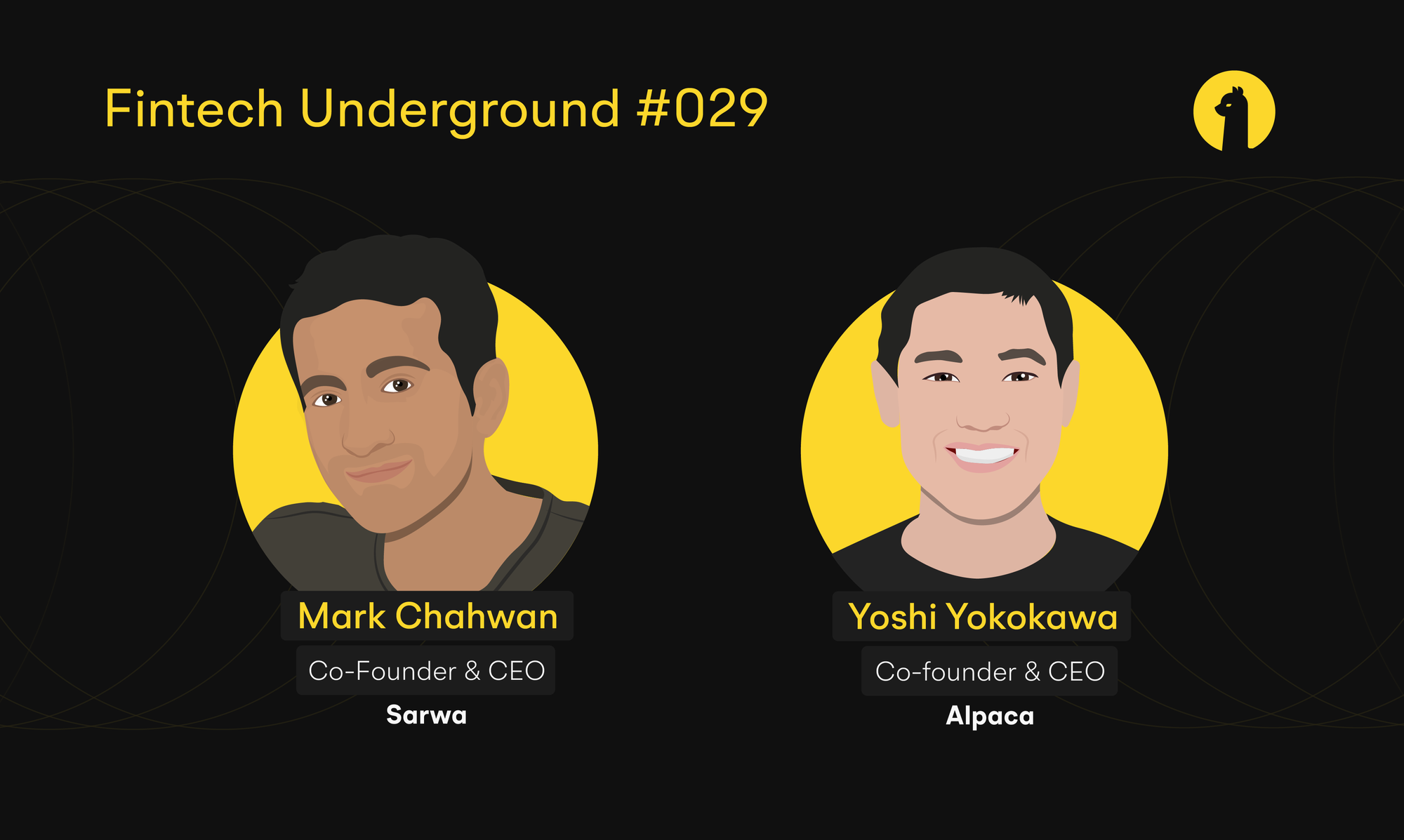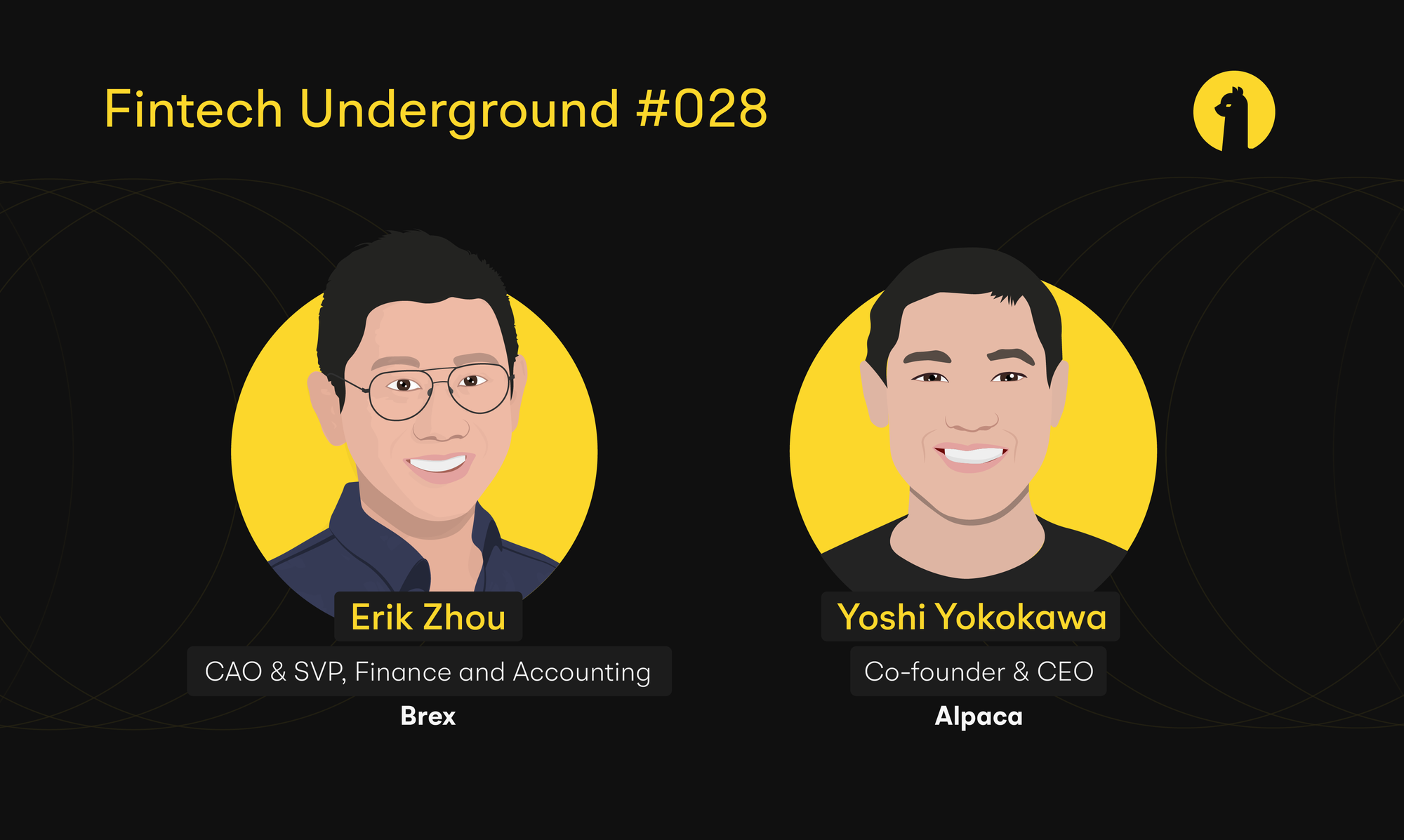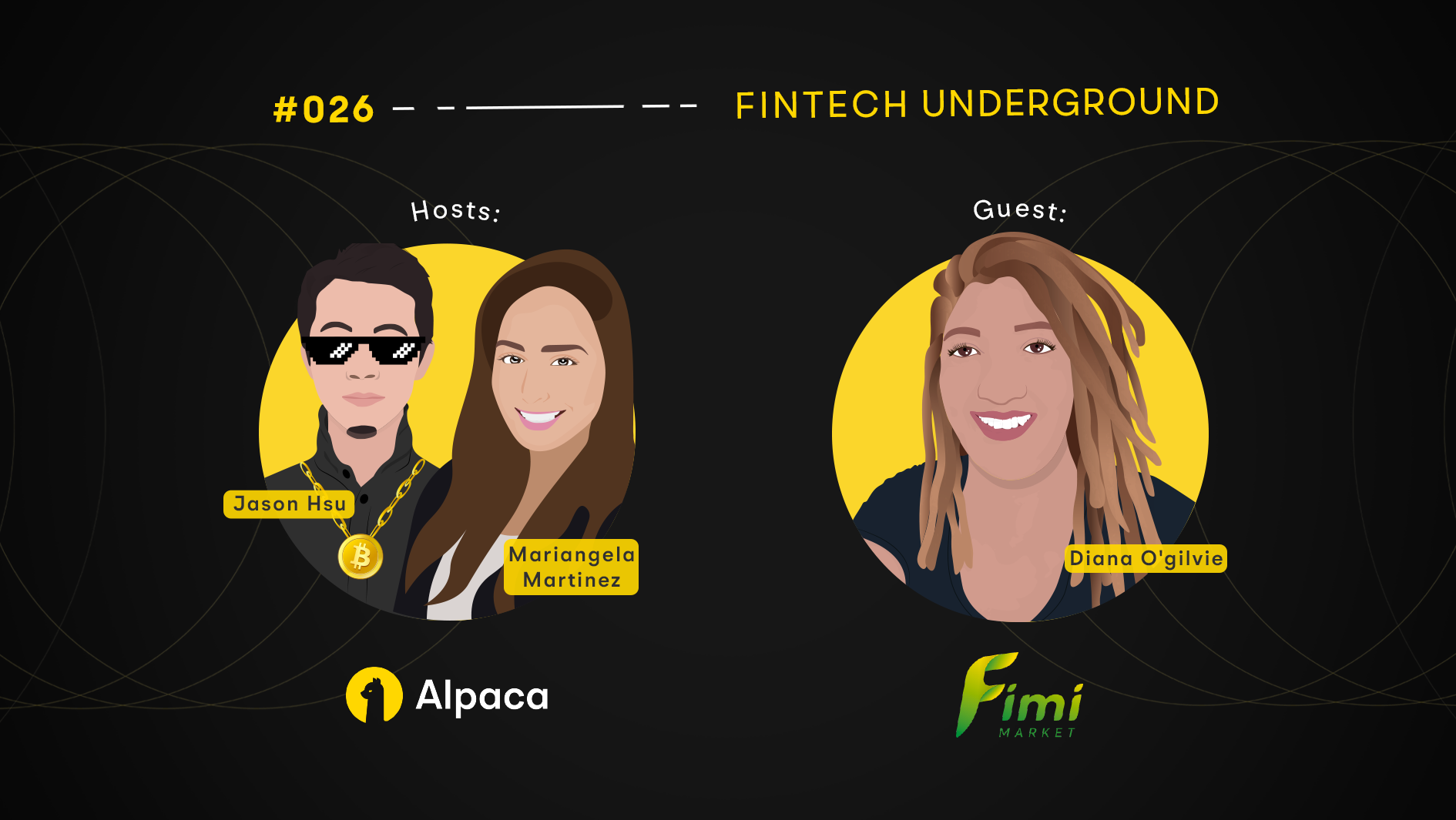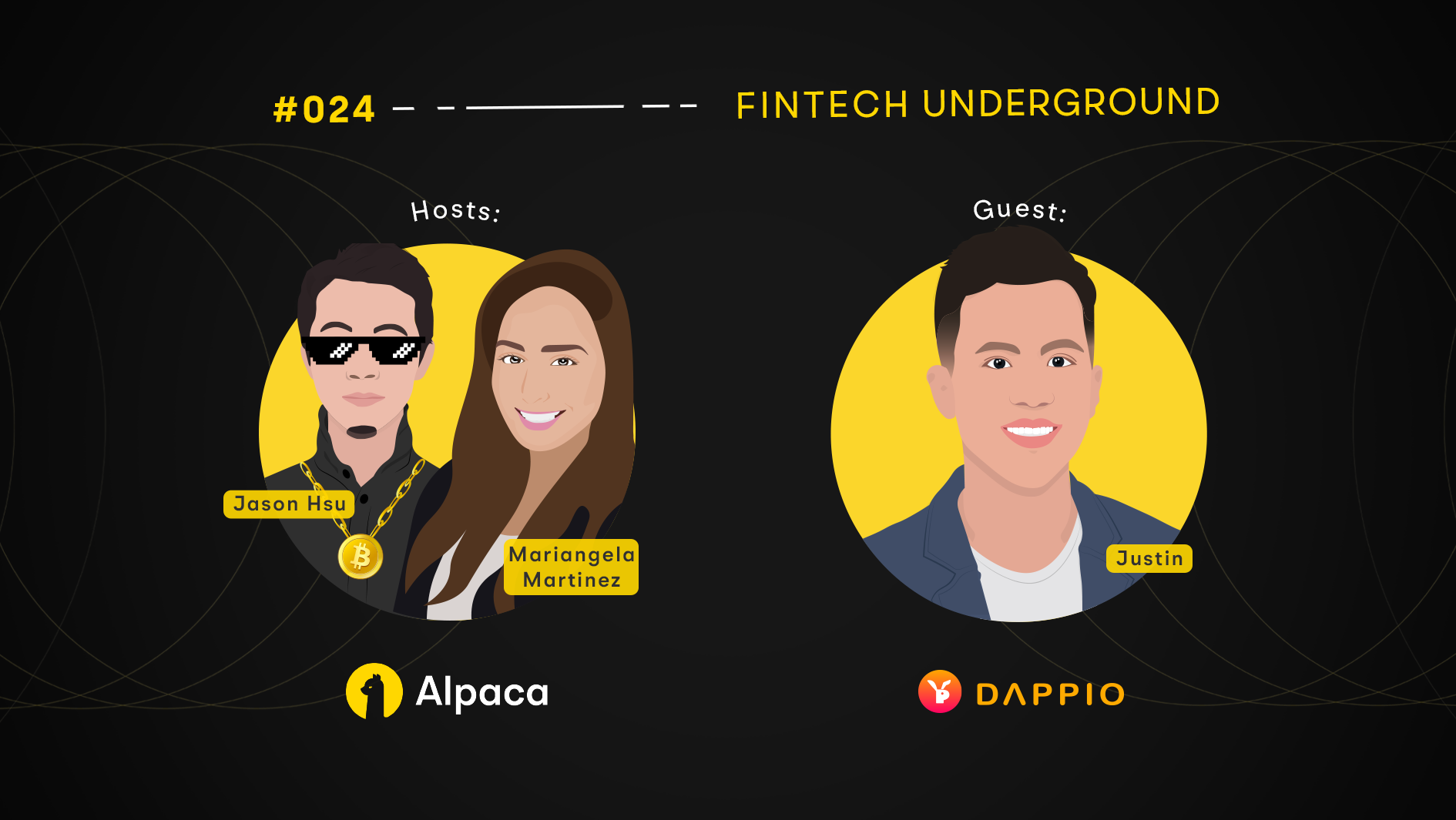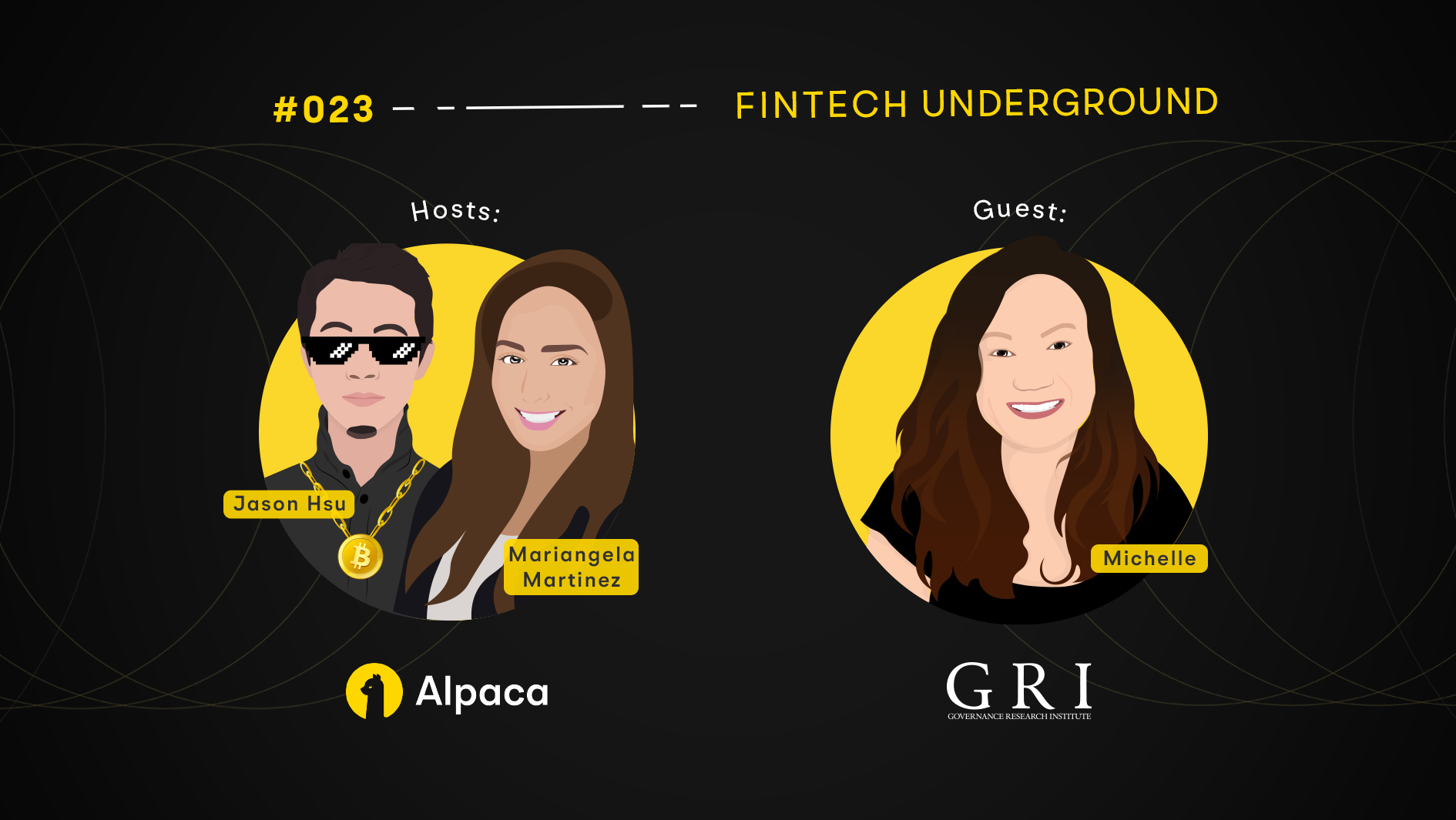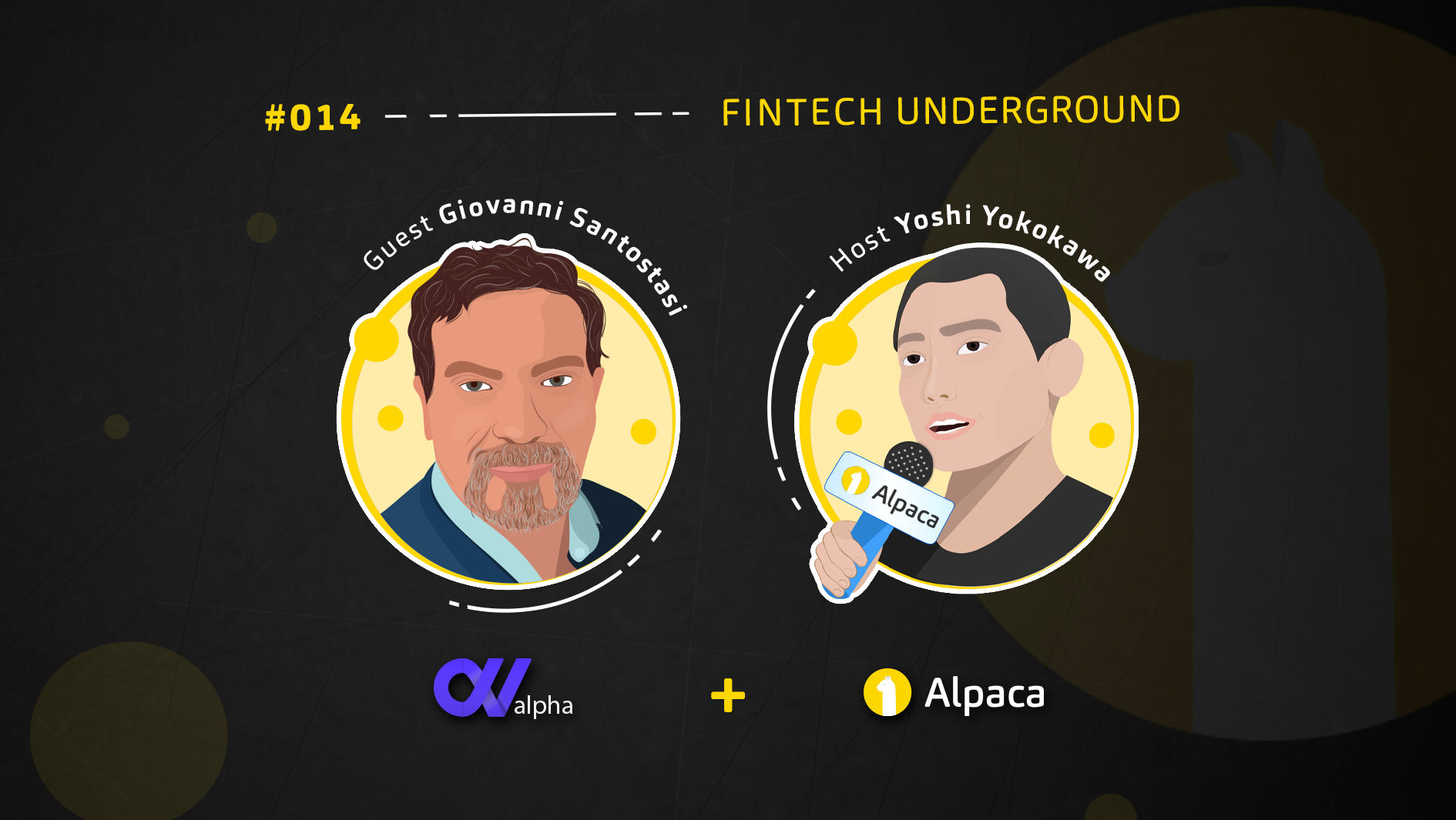
Any opinions expressed are opinions of the host and their guests. The content is for general information only and is believed to be accurate and reliable as of posting date but may be subject to change. Alpaca Securities LLC does not recommend any specific investments or investment strategies. Alpaca Securities LLC does not provide investment, tax, or legal advice.
Fintech Underground by Alpaca is a podcast devoted to all topics related to stock trading and APIs. From trading with algorithms or connecting apps or building out services, we aim to bring light to the different corners of Fintech.

TL;DR
On our fourteenth episode of Fintech Underground by Alpaca, we interviewed Giovanni Santostasi. As the CEO and Founder of AlphaHub and Quantonomy, Giovanni discusses his trading philosophy, his background in neuroscience and physics, and the primary users of Quantonomy and AlphaHub.
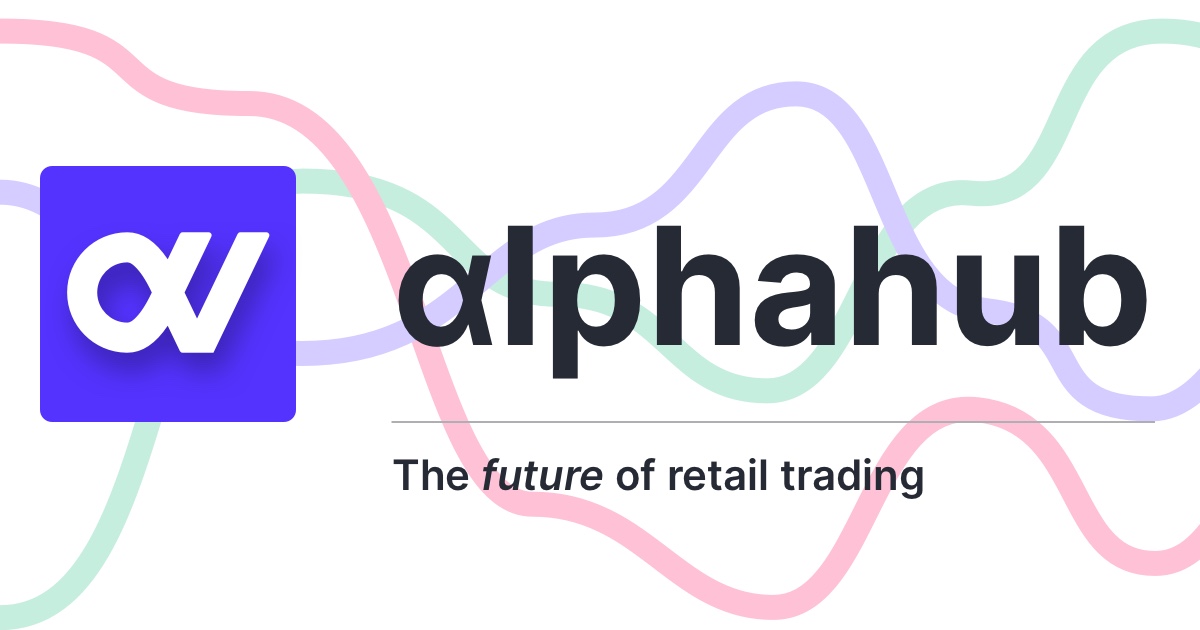

Find the full transcript below. To hear more CEO/Founders of the most interesting Fintech companies speak about their experience in the industry check out our other episodes below.
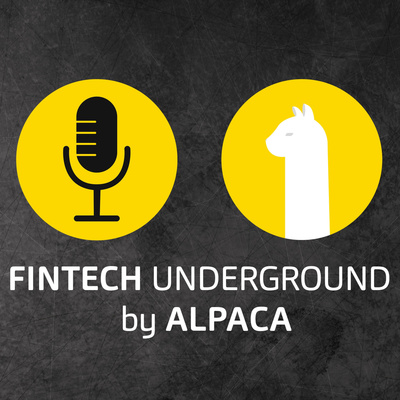
Full Transcript
Crystal: [00:00:00] Hi, everyone. Welcome back to Fintech Underground by Alpaca, the podcast devoted to stock trading API. From algorithmic trading to connecting apps to building out services, Alpaca is built for developers and traders. In each episode, we aim to explore a different area within FinTech.
Today we're very fortunate to have Giovanni Santostasi, CEO and Founder of AlphaHub, which drives AI-driven stock trading signals, and Quantonomy, an algorithmic trading firm that combines AI, machine learning, and econophysics to create adaptive training algorithms.
As usual Yoshi, CEO and Co-founder of Alpaca, is our host for today's episode. So let's jump right in!
Yoshi: [00:00:42] Hi, Giovanni how are you today? Thank you very much for coming to our podcast, Fintech Underground.
Giovanni: [00:00:48] Thank you for hosting me.
Yoshi: [00:00:49] Yeah, I know we have a lot to talk about. So Giovanni is the CEO and Founder of Quantonomy and AlphaHub. Do you want to give a quick elevator pitch of what you do at Quantonomy and AlphaHub and what it does?
Giovanni: [00:01:04] Yeah, Quantonomy is an R&D company that is focused on developing algorithms for algo trading. We have about five years of experience in trading different markets from crypto to stocks. We also tried different international markets, but basically, we have a very special philosophy, we call it our trading manifesto. We have a philosophy, or how we think about trading, and it kind of summarizes our experience over these years. In following this philosophy, we came up with these very powerful algorithms that at the moment we are trading mostly with NASDAQ stocks. So we produce signals and we post the signal on our platform called AlphaHub. Users can interface with our platform, get the signals, and do trading with the signals.
Yoshi: [00:02:03] Great! I think I've kind of known you for almost a couple of years now. When we launched our first product, Trading API, you were trying it out as the user entity, because I remember we chatted a little bit, that you've been trading crypto and now you were going into the stock market, right?
Giovanni: [00:02:24] Correct, yes. We started with crypto, that is our origin story. We learned a lot of things from trading in crypto. In fact, actually, we started to test out battle algorithms, let's call them that, in the crypto market. And there are very interesting lessons; it's a 24 hour market and you have to create robust systems.
We were also trading a very relatively I frequency rate, like every five minutes. So we learned a lot of things about it, the environment, and the set up point we wanted to try other things. In particular, when the market crashed though, after 2017, we wanted to see if our algorithms were also working in the stock market, and in this way, we made the transition.
Yoshi: [00:03:06] Yeah. So I think actually a lot of people are wondering the same thing, right? What we kind of see is the second market hype and crash or second or third time in crypto now, it's becoming a little bit less volatile, and the market's pretty slow.
I think people who have had a good experience trading in crypto are like oh, the stock market has always been there. How does it work? Implementing algorithms that worked in crypto into the stock market. What was the learning and what was your experience implementing the algos that worked in crypto into the stocks?
What did you have to think about, like experimenting that into the different markets, specifically in the stock market?
Giovanni: [00:03:50] So there are issues in terms of performance or general strategy. And in our case, that is what is very surprising because, as I explained, we have this trading philosophy.
I can go a little bit more in the details of our trading philosophy. One of the things that we observed is that instead of focusing on the behavior of one single asset, we want to look at several assets at the same time. It's kind of almost like the starting point for our philosophy. We make a claim that it's almost impossible to follow one single asset.
And when I say follow, that is the other thing -- we try to predict the market. We are not trying to react to the market, so we are trying to make models. And my background is in physics. I have a PhD in Physics. Also, I worked in the field of neuroscience and did similar things in my career in these different fields.
For example, in neuroscience, I created a model that is trying to predict the behavior of a brain during sleep. And I'd stimulate the brain by using sounds and I use brain waves and that's why I make models of what the brain will do next in very short timescales, using artificial intelligence or machine learning.
And so I had the same approach with markets. I wanted to predict that at the end, not react to them. So we are without political philosophy and that we applied that to several stocks at once. So we usually create a portfolio of assets. One of the many issues though, this is relevant in terms of Alpaca, was execution.
So we will use with the crypto markets to modern APIs, ease of use or the reliability of these APIs. So I didn’t even know about Alpaca at all. And I've had that actually, that was one of our demands, right? We want to find a broker that has a nice API, like the ones we are using in the crypto market.
And there was almost nothing. And you guys just came out during the time we were. I think you went online more or less when we decided to move to a stock market. And you were actually one of the main reasons why we did that; because we had a platform, Alpaca, which allowed us to modify slightly our interface in terms of the API, it was familiar.
It was very similar to what we use in the crypto market.
Yoshi: [00:06:21] Yeah. So all the crypto programmatic traders should have come to Alpaca for the modern REST API to implement.
Giovanni: [00:06:29] Absolutely. And in fact, actually, I'm very disappointed about, for example, the European aspects of things, because we looked everywhere for the equivalent.
You know, I did this search and Alpaca equivalent in Europe, but couldn't find anything. We have a lot of people that are coming from Europe, you know, Italy, Germany, and so on. And we played in the American market because we can buy the stock. But then when it's a question of allowing them to trade automatically because AlphaHub, but you know, the signal server there, and then, in theory, people can do whatever they want with the signal. They can trade manually, they can write their own algorithms. So we try to follow our members. We call the people that work with us with our members, because we are basically a community.
The members almost always look for some kind of automatic solution. So we have a GUI with these retaining MATLAB that I wrote. I'm familiar with MATLAB. MATLAB is not the easiest thing to use the interface with the web but Alpaca API, so nice with that. I could even do it. So my philosophy is if I can do it, anybody can do it.
And there were all these GUI that people can use and they can use with Alpaca account to fetch our signals. So we have our own API, you can fetch for signals using this API and then through my tray there, and people can find it, you know, I'm sure there'll be some links. Talk to people who can find these, trade that online, it's on our GitHub, event, they can connect to Alpaca.
Yoshi: [00:08:15] When you were doing a lot of neuroscience and sound waves, obviously sound is a time-series data, and I'm sure machine learning, AI, so using some kind of deep learning or LSTM kind of stuff. What was that aha moment like, maybe I'm going to try to utilize what I know in the market?
Giovanni: [00:08:37] Yeah, so this is my story. I loved science since I was a little kid and I see the world in terms of mathematics, right? I see patterns and I'm very good at visualizing things.
So, I notice this universality. This is typical of physics. We like to see patterns that are universal, doesn't matter where you are. For example, in physics, I started with astrophysics. I was studying gravitational waves and also relation, so what happens with the brain.
When I went to neuroscience, it was familiar territory, right? Time series or simulation. So I started to use kind of the same tools that I was using in astrophysics and that I got, I was successful. You know, I publish papers with a lot of interest. I was able to patent an invention to stimulate the brain.
But that is the other half of my life I'm trying to develop a bit, uh, projects too. In terms of applying these ideas to finance, I started with Bitcoin. We use a relatively simple matrix. So when I say that I'm using machine learning and we start though with something much simpler, we want to understand the market.
We have some relatively simple models and these models are predictive of how the stock market will behave. And then on top of that, we try to use these models to make predictions. We add a little bit of machine learning, but these are an aid instead of being the core of what we do.
We first want to understand ourselves as humans, what the market is doing. And then we add some layers of complications and sophistication to have passed, to make our position better. But my suggestion to algo traders, you always want to start with understanding. You want to come up with some intuition of what the market is doing and it's actually true.
You can do it. That is the other thing that we do. It's not just about producing the signals. We also want to educate our members. We want to share our ideas, up to a point of course, right? Because this field is relatively secret. You know, whereout, if you have any idea, if you have anything and it works, something that I hear all the time, you need to keep it a secret.
You don't want to share it. We are not sharing our core trading secrets. Let's call them Lovato, you know, sauce, our philosophy, our way of thinking about the market. We have a lot of suggestions, a lot of even exercises, that people that can try. Some very simple ideas. So we like that. We like that people try some of these things with us.
Yoshi: [00:11:22] Yeah. So how was your journey from actually trading in the crypto market with Bitcoin and them, you know, you move your algorithms to Alpaca and trading here and there, but now you're also kind of generating signals and providing that to your community.
So are you still trading your own funds or focusing on that generating signals for the members?
Giovanni: [00:11:50] We do both, right? So that was a very difficult decision for us because again, we have something that works. It works well. Let's keep it for ourselves. So we do have a fund or a small fund, but then we share this information, right?
Like through a service, for example. And that was a very natural choice for us, even though we had to think about it, but because we came from a crypto market and the crypto market tends to be much more sharing in terms of ideas, it's more like a community. We are all in this together. We are trying to go against a system.
You know, all of this crypto philosophy, rebellious crypto philosophy, we brought it with us to the stock market. So it was kind of natural to say, yeah, let's create that. It's not just a question of business. It was a question of, just, we wanted to share this enthusiasm for trading and doing something different than other people do. And so it was natural for us to try to create a community.
Yoshi: [00:12:49] What are the typical users and the community members of your platform and what are they looking for from you and your product?
Giovanni: [00:12:58] We actually did a survey at a certain point. We ask these questions, what people like, why they are trading, etc., so the typical user is somebody that is interested in learning about trading. Some of them are actually developers because while we create a signal for them, so they don't have to worry about all the details of the strategy. But there's an execution part, right? So people can use our API, fetch with signal.
We have a web socket, and then they created their own versions of the execution component of the trading. So, and there is a lot to say there. Like for example, that is one of the things I don't hear often people discuss even in these subreddits, etc. about algo trading. So we would write our own codes about the execution aspects of things.
And we share them on GitHub with our users, but there is also information coming from them in a sense with us. So, to answer your question, a lot of our users are actually developers themselves. They are coders, algo traders, and they write codes, but then they share with the community. And so we have a GitHub where we have what we call community solutions.
So they write code in C++, we call it C-sharp or different type of languages, Twitter face with our API invents sends a signal. Most of them, most of these community solutions use Alpaca exactly for the same reasons, because a couple of people tried to interface with Ameritrade or the brokers, but it's so much more complicated because unfortunately the other brokers don't develop APIs like you guys have.
Now, I think the core of our users is actually developers. So probably, people who are not interested in developing their own code is a relatively small number. We try to appeal to all these different types of users, but the typical person, even if they are not interested in developing their own code, is still interested in how the algorithm works.
So we are trying to share as much information as possible in terms of what we did. This is why I wrote this manifesto that you can find on our website. This idea that we have a portfolio of assets, that we want to predict instead of react, we are continuously monitoring our signals and for example, almost all we are and what we do is open source, in the sense that I don't maybe reveal the details of what we do. But if I have a graph of a new algorithm, I immediately share it with my users. People are asking me, okay, can we do this? We take a lot of input and how can we try trading in this market. It's a community.
Yoshi: [00:15:43] If you are targeting developers, I think open sourcing code. I mean, those are the key and at Alpaca we care a lot about that. We're approaching the ending time here but there's a question that we always ask the participant of the podcast.
So you working on a lot of researches and neuroscience and things that have no relations to finance, and now you're putting your technology and the know-how that you've learned in different industries into the financial services, but obviously, there's a lot of data and a lot of type of asset classes and even getting the data, it's always kind of tough and dealing with regulations, compliance, and stuff.
Is it worth it for you? To put your research and know-how that you've created in the past experience into the finance, is it worth it to deal with all those complications that you have to deal with right now?
Giovanni: [00:16:45] Yeah, it's a tough question. And it's a good question because many times, without all these misconceptions, for example, you know, I hear all the time, okay, if you have an algorithm that can make 2x a year, why are you not super wealthy or why are you not a multimillionaire, a billionaire? Well, exactly because of that, because even if you have a strategy, at least on paper, there are all these issues about getting good data, you know, reliable data. That is something that we are struggling with all the time, because even if we pay for resources, sometimes the data is not good quality.
You have to clean it. Then there are execution issues, all these kinds of things. So we are going there. We are relatively successful and it will take time before we are a strong, self-sufficient company, but it is worthwhile. Yes, absolutely.
First of all, because the science of the markets is beautiful; it's a beautiful map. It's a very challenging environment, among all the different environments to work with. So it's very challenging intellectually in terms of worthwhile interactions with members, because that is where, the question of why you're sharing your knowledge. If you have anything good, you know, you're going to lose alpha.
I don't believe in this idea that you're going to lose alpha, by the way. And a certain point, of course, probably we're not going to have ten thousand members. We don't want to deal with that. Probably we are going to keep out our family relatively close, maybe to a few hundred members at most. But our members make it worthwhile too, because there is an element of sharing and information comes in both directions.
We learn all the time from our members. We are still testing this model, the business models, you know, having that own fund and then having the members. But I think it will work out. It will be relatively successful over time economically, and there are many different markets to explore. We are not there yet because we are a relatively young startup and there are a lot of challenging regulations, but I think eventually we will be, it's probably one of the most exciting and rewarding things if you do it right. If you aren’t, if you do it just for the money, there are probably many other things you can do. If you add these other components, I think it makes it worthwhile.
Yoshi: [00:19:11] That's a great, great ending comment. I think the market is beautiful from the science view, keeping family close and tight, I felt like I got some Italian vibe there, that family is extremely important.
Giovanni: [00:19:29] Yeah, my dream will be one day we make a big table and we all get pasta to cook for everybody. You are invited, by the way!
Yoshi: [00:19:41] Godfather style. Got it. Well, Giovanni, thank you very much for coming to the show and thank you very much for sharing about your product and your life's journey. It's been super fun to hear what you have to share. Thanks again, everyone. This is Giovanni. Thank you.
Giovanni: [00:19:58] Thank you, and keep up the good work.
Crystal: [00:20:01] Thank you for joining us today on this episode of FinTech underground by alpaca. As always check out all of our past episodes on Apple podcasts, Spotify, and other major streaming platforms.
If you liked this episode of Fintech Underground by Alpaca, make sure to check out our other episodes below!

You can also follow Alpaca and our weekly updates on our LinkedIn and Twitter.
Brokerage services are provided by Alpaca Securities LLC ("Alpaca"), member FINRA/SIPC, a wholly-owned subsidiary of AlpacaDB, Inc. Technology and services are offered by AlpacaDB, Inc.



